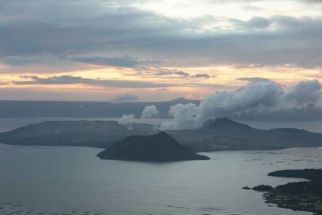PEA: SC ruling on Amari deal affects revenue drive
August 21, 2002 | 12:00am
The Public Estates Authority (PEA) has told the Supreme Court (SC) that its July 9 ruling junking the government’s contract with Amari Coastal Bay Development Corp. was a setback to administration’s efforts to collect more revenues from government projects.
In its 25-page supplemental appeal, the PEA claimed the decision would "lead to substantial losses in revenues for the government" as owners of these reclaimed lands along Roxas Boulevard "may suspend payment of real estate taxes."
It added that private firms holding land titles may back out "in view of the uncertainty of their titles thereby affecting the tax collection of both local and national governments."
The PEA urged the SC to look at "the bigger picture" since Amari is not the only one affected by the ruling "but the whole reclamation program of the government which is to increase the supply of land for commercial, industrial and residential purposes."
Thirteen justices maintained that the government cannot sell lands to private firms because only "Philippine citizens" are entitled to it. This includes "submerged areas" of Manila Bay, which remain under the "public domain."
But like Amari, PEA warned that such position endangers further the loss of confidence of foreign investors in the country, as this puts to a halt other finished and ongoing reclamation projects.
"This is not to mention the other reimbursable expenses which may include not only the actual costs of reclamation and development but also the taxes paid to the government by private corporations," PEA asserted.
PEA claimed that nullifying such contracts at this point "erodes further the inves-tors’ confidence in the credibility of the government and in the way businesses are conducted in the Philippines."
So far, seven prominent local private firms who developed reclaimed lands along the Roxas Boulevard stretch were adversely affected by the SC decision which junked the government’s contract with Amari Coastal Bay Development Corp.
The Thai developer said it lost at least P9.8 billion in its bid to make true its promise to develop its part on the Manila-Cavite Coastal Road and Reclamation Project (MCCRRP), otherwise known as "Boulevard 2000."
Among the other firms who promised to develop the project were the Manila Bay Development Corp., Pasay-Hong Kong Development Corp., R1 Consortium, Asiaworld Properties, SM Properties Inc. and Coastal Road Corp.
In a 52-page appeal, Amari lamented that the dismissal of the PEA-Amari May 1999 re-negotiated contract has "resulted in immeasurable damage" to the investing public, as well as the other firms that "relied" on the government’s "good faith."
"The country too loses with this decision. The Philippines is already losing out rapidly in attracting new foreign investors. This decision will only support the view that the government has no established and stable investment and business policy," they said.
"The vision of MCCRRP now rests on shaky ground. The invalidation also underscores the helplessness of the private sector in coping with a business environment where rules long established may be declared invalid and changed without fair warning."
Represented by the Romulo, Mabanta, Buenaventura, Sayoc and Delos Angeles Law Office, the foreign-owned firm even singled out Vietnam, which, they stressed, is "making headway in attracting foreign investments."
"No wonder investors say that they cannot plan for anything in the Philippines for a period of more than five years. This decision, as it now stands, proves that statement is true," Amari stated with sarcasm.
"The question that the shareholders and investing public now pose is, how will Amari be compensated for its expenses in relying on good faith on the government? As of June 2002, the consolidated project cost to Amari amounts to a whopping P9.8 billion."
The justices held that the deal violated "glaringly" two constitutional provisions – Section 2 and 3 of Article 12 – prohibiting the "alienation of natural resources other than agricultural lands" and "private firms from acquiring any kind of alienable land."
"The PEA and Amari are permanently enjoined from implementing the amended Joint Venture Agreement which is hereby declared null and void ab initio (from the start)," Justice Antonio Carpio stated in the 76-page decision he wrote.
But Solicitor General Simeon Marcelo disagreed by invoking in their appeal that lands in the Freedom Islands are all documented and are considered PEA’s "patrimonial properties" which can be validly sold to "qualified private corporations."
"It creates a state of uncertainty on the other major reclamation projects of PEA, some of which have already been completed," the Office of the Solicitor General stressed, pointing out that reclamation costs alone actually reach billions.
Marcelo opined further that since the PEA charter allows it to "sell any and all kinds of lands," it only follows that there is legislative authority granted to PEA to sell its property whether patrimonial or alienable lands of the public domain.
In its 25-page supplemental appeal, the PEA claimed the decision would "lead to substantial losses in revenues for the government" as owners of these reclaimed lands along Roxas Boulevard "may suspend payment of real estate taxes."
It added that private firms holding land titles may back out "in view of the uncertainty of their titles thereby affecting the tax collection of both local and national governments."
The PEA urged the SC to look at "the bigger picture" since Amari is not the only one affected by the ruling "but the whole reclamation program of the government which is to increase the supply of land for commercial, industrial and residential purposes."
Thirteen justices maintained that the government cannot sell lands to private firms because only "Philippine citizens" are entitled to it. This includes "submerged areas" of Manila Bay, which remain under the "public domain."
But like Amari, PEA warned that such position endangers further the loss of confidence of foreign investors in the country, as this puts to a halt other finished and ongoing reclamation projects.
"This is not to mention the other reimbursable expenses which may include not only the actual costs of reclamation and development but also the taxes paid to the government by private corporations," PEA asserted.
PEA claimed that nullifying such contracts at this point "erodes further the inves-tors’ confidence in the credibility of the government and in the way businesses are conducted in the Philippines."
So far, seven prominent local private firms who developed reclaimed lands along the Roxas Boulevard stretch were adversely affected by the SC decision which junked the government’s contract with Amari Coastal Bay Development Corp.
The Thai developer said it lost at least P9.8 billion in its bid to make true its promise to develop its part on the Manila-Cavite Coastal Road and Reclamation Project (MCCRRP), otherwise known as "Boulevard 2000."
Among the other firms who promised to develop the project were the Manila Bay Development Corp., Pasay-Hong Kong Development Corp., R1 Consortium, Asiaworld Properties, SM Properties Inc. and Coastal Road Corp.
In a 52-page appeal, Amari lamented that the dismissal of the PEA-Amari May 1999 re-negotiated contract has "resulted in immeasurable damage" to the investing public, as well as the other firms that "relied" on the government’s "good faith."
"The country too loses with this decision. The Philippines is already losing out rapidly in attracting new foreign investors. This decision will only support the view that the government has no established and stable investment and business policy," they said.
"The vision of MCCRRP now rests on shaky ground. The invalidation also underscores the helplessness of the private sector in coping with a business environment where rules long established may be declared invalid and changed without fair warning."
Represented by the Romulo, Mabanta, Buenaventura, Sayoc and Delos Angeles Law Office, the foreign-owned firm even singled out Vietnam, which, they stressed, is "making headway in attracting foreign investments."
"No wonder investors say that they cannot plan for anything in the Philippines for a period of more than five years. This decision, as it now stands, proves that statement is true," Amari stated with sarcasm.
"The question that the shareholders and investing public now pose is, how will Amari be compensated for its expenses in relying on good faith on the government? As of June 2002, the consolidated project cost to Amari amounts to a whopping P9.8 billion."
The justices held that the deal violated "glaringly" two constitutional provisions – Section 2 and 3 of Article 12 – prohibiting the "alienation of natural resources other than agricultural lands" and "private firms from acquiring any kind of alienable land."
"The PEA and Amari are permanently enjoined from implementing the amended Joint Venture Agreement which is hereby declared null and void ab initio (from the start)," Justice Antonio Carpio stated in the 76-page decision he wrote.
But Solicitor General Simeon Marcelo disagreed by invoking in their appeal that lands in the Freedom Islands are all documented and are considered PEA’s "patrimonial properties" which can be validly sold to "qualified private corporations."
"It creates a state of uncertainty on the other major reclamation projects of PEA, some of which have already been completed," the Office of the Solicitor General stressed, pointing out that reclamation costs alone actually reach billions.
Marcelo opined further that since the PEA charter allows it to "sell any and all kinds of lands," it only follows that there is legislative authority granted to PEA to sell its property whether patrimonial or alienable lands of the public domain.
BrandSpace Articles
<
>
- Latest
- Trending
Trending
Latest
Trending
Latest
Recommended




























